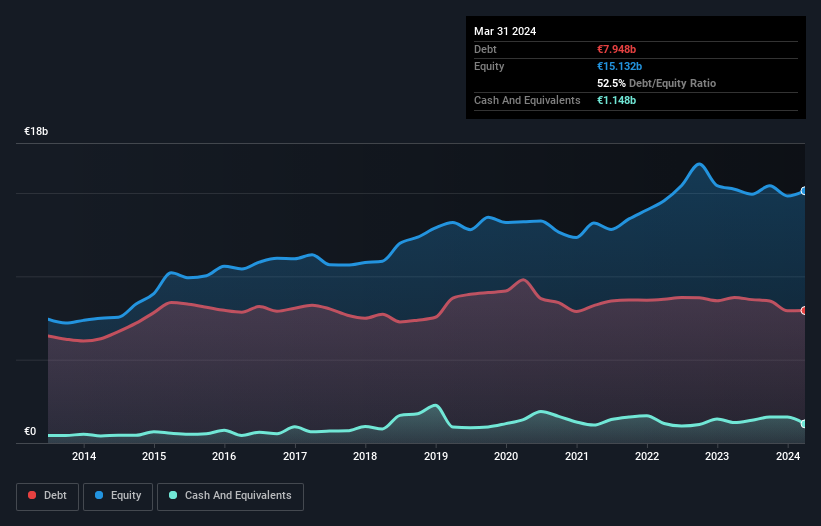- Germany
- /
- Healthcare Services
- /
- XTRA:FME
These 4 Measures Indicate That Fresenius Medical Care (ETR:FME) Is Using Debt Extensively

The external fund manager backed by Berkshire Hathaway's Charlie Munger, Li Lu, makes no bones about it when he says 'The biggest investment risk is not the volatility of prices, but whether you will suffer a permanent loss of capital.' So it might be obvious that you need to consider debt, when you think about how risky any given stock is, because too much debt can sink a company. Importantly, Fresenius Medical Care AG (ETR:FME) does carry debt. But the real question is whether this debt is making the company risky.
What Risk Does Debt Bring?
Debt assists a business until the business has trouble paying it off, either with new capital or with free cash flow. Part and parcel of capitalism is the process of 'creative destruction' where failed businesses are mercilessly liquidated by their bankers. However, a more common (but still painful) scenario is that it has to raise new equity capital at a low price, thus permanently diluting shareholders. Of course, the upside of debt is that it often represents cheap capital, especially when it replaces dilution in a company with the ability to reinvest at high rates of return. When we examine debt levels, we first consider both cash and debt levels, together.
See our latest analysis for Fresenius Medical Care
What Is Fresenius Medical Care's Debt?
You can click the graphic below for the historical numbers, but it shows that Fresenius Medical Care had €7.95b of debt in March 2024, down from €8.74b, one year before. However, because it has a cash reserve of €1.15b, its net debt is less, at about €6.80b.

How Strong Is Fresenius Medical Care's Balance Sheet?
According to the last reported balance sheet, Fresenius Medical Care had liabilities of €6.20b due within 12 months, and liabilities of €13.0b due beyond 12 months. Offsetting these obligations, it had cash of €1.15b as well as receivables valued at €4.05b due within 12 months. So its liabilities total €14.0b more than the combination of its cash and short-term receivables.
Given this deficit is actually higher than the company's massive market capitalization of €11.3b, we think shareholders really should watch Fresenius Medical Care's debt levels, like a parent watching their child ride a bike for the first time. Hypothetically, extremely heavy dilution would be required if the company were forced to pay down its liabilities by raising capital at the current share price.
We measure a company's debt load relative to its earnings power by looking at its net debt divided by its earnings before interest, tax, depreciation, and amortization (EBITDA) and by calculating how easily its earnings before interest and tax (EBIT) cover its interest expense (interest cover). This way, we consider both the absolute quantum of the debt, as well as the interest rates paid on it.
Fresenius Medical Care's debt is 2.7 times its EBITDA, and its EBIT cover its interest expense 4.6 times over. Taken together this implies that, while we wouldn't want to see debt levels rise, we think it can handle its current leverage. Fresenius Medical Care grew its EBIT by 4.1% in the last year. Whilst that hardly knocks our socks off it is a positive when it comes to debt. There's no doubt that we learn most about debt from the balance sheet. But it is future earnings, more than anything, that will determine Fresenius Medical Care's ability to maintain a healthy balance sheet going forward. So if you want to see what the professionals think, you might find this free report on analyst profit forecasts to be interesting.
But our final consideration is also important, because a company cannot pay debt with paper profits; it needs cold hard cash. So the logical step is to look at the proportion of that EBIT that is matched by actual free cash flow. Happily for any shareholders, Fresenius Medical Care actually produced more free cash flow than EBIT over the last three years. That sort of strong cash generation warms our hearts like a puppy in a bumblebee suit.
Our View
Fresenius Medical Care's level of total liabilities and net debt to EBITDA definitely weigh on it, in our esteem. But the good news is it seems to be able to convert EBIT to free cash flow with ease. It's also worth noting that Fresenius Medical Care is in the Healthcare industry, which is often considered to be quite defensive. We think that Fresenius Medical Care's debt does make it a bit risky, after considering the aforementioned data points together. Not all risk is bad, as it can boost share price returns if it pays off, but this debt risk is worth keeping in mind. The balance sheet is clearly the area to focus on when you are analysing debt. However, not all investment risk resides within the balance sheet - far from it. These risks can be hard to spot. Every company has them, and we've spotted 2 warning signs for Fresenius Medical Care you should know about.
When all is said and done, sometimes its easier to focus on companies that don't even need debt. Readers can access a list of growth stocks with zero net debt 100% free, right now.
New: AI Stock Screener & Alerts
Our new AI Stock Screener scans the market every day to uncover opportunities.
• Dividend Powerhouses (3%+ Yield)
• Undervalued Small Caps with Insider Buying
• High growth Tech and AI Companies
Or build your own from over 50 metrics.
Have feedback on this article? Concerned about the content? Get in touch with us directly. Alternatively, email editorial-team (at) simplywallst.com.
This article by Simply Wall St is general in nature. We provide commentary based on historical data and analyst forecasts only using an unbiased methodology and our articles are not intended to be financial advice. It does not constitute a recommendation to buy or sell any stock, and does not take account of your objectives, or your financial situation. We aim to bring you long-term focused analysis driven by fundamental data. Note that our analysis may not factor in the latest price-sensitive company announcements or qualitative material. Simply Wall St has no position in any stocks mentioned.
Have feedback on this article? Concerned about the content? Get in touch with us directly. Alternatively, email editorial-team@simplywallst.com
About XTRA:FME
Fresenius Medical Care
Provides dialysis and related services for individuals with renal diseases in Germany, the United States, and internationally.
Excellent balance sheet established dividend payer.
Similar Companies
Market Insights
Community Narratives



